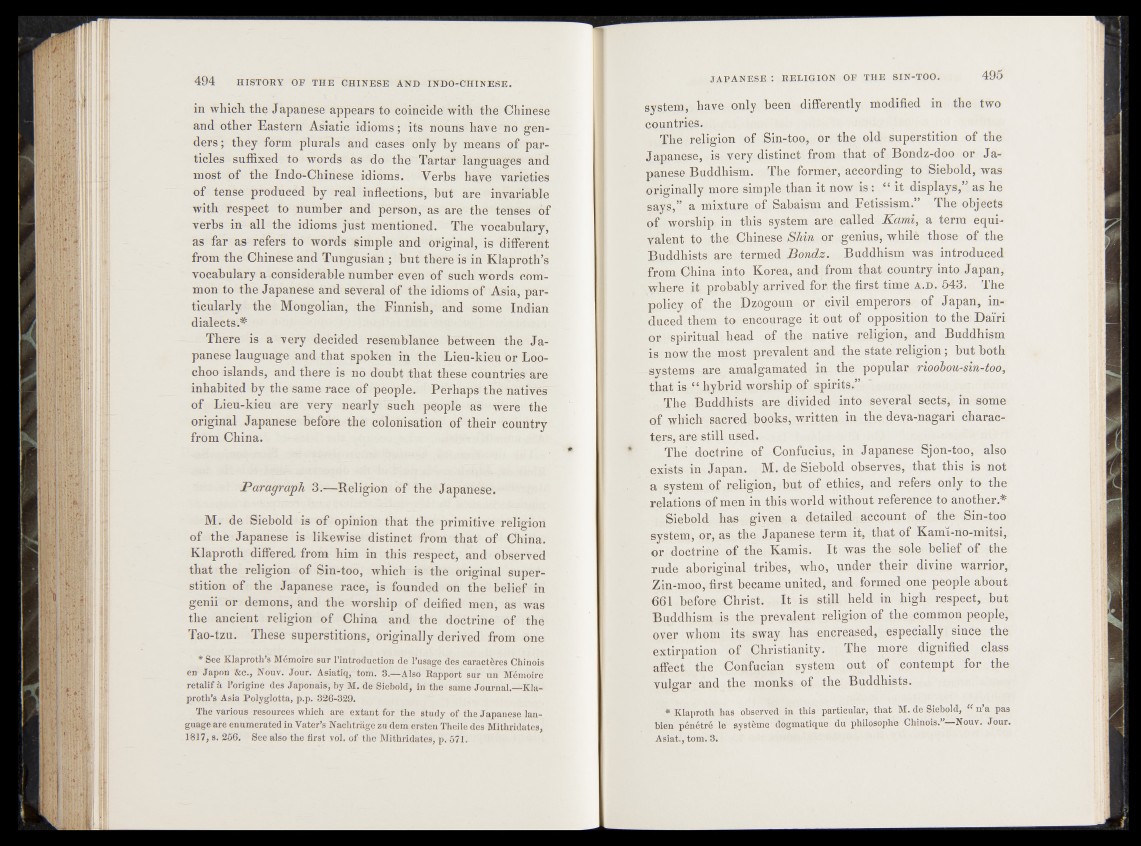
in which the Japanese appears to coincide with the Chinese
and other Eastern Asiatic idioms ; its nouns have no genders
; they form plurals and Cases only by means of particles
suffixed to words as do the Tartar languages and
most of the Indo-Chinese idioms. Verbs have varieties
of tense produced by real inflections, but are invariable
with respect to number and person, as are the tenses of
verbs in all the idioms just mentioned. The vocabulary,
as far as refers to words simple and original, is different
from the Chinese and Tungusian ; but there is in Klaproth’s
vocabulary a .considerable number even of such words common
to the Japanese and several of the idioms of Asia, particularly
the Mongolian, the Finnish* and some Indian
dialects.*
There is a very decided resemblance between the Japanese
language tod that spoken in the Lieu-kieu or Loo-
choo islands, and there is no doubt that these countries are
inhabited by the same race of people. Perhaps the nati¥e¥
of Lieu-kieu are very nearly such people as were thé
original Japanese before the colonisation of their country
from China.
Paragraph 3.—Religion of the Japanese.
M. de Siebold is of opinion that the primitive religion
of the Japanese is likewise distinct from that? Of*China.
Klaproth differed from him in this respect, and observed
that the religion of Sin-too, which is1 the original superstition
of the Japanese race, is founded on the'belief4n
genii or demons, and the worship of deified men, as was
the ancient religion of China and the doctrine of the
Tao-tzu. These superstitions, originally derived from one
*See Klaproth’s Mémoire sur rintrqduction de l’usage des caractères Chinois
en Japon «ce., NouV. Jour. Asiatiq/torn. 8.-—Also Rapport sur un Mémoire
retalifà Porigine des Japonais, by M. de Siebold, in the same Journal.—-Klaproth’s
Asia Polyglotta, p.p. 826-329.
The various resources which are extant for the study of the Japanese language
are enumerated in Vater’s Nachtrage zu dem ersten Theile des Mithridates,
1817, s. 256. See also the first vol. of the Mithridates, p. 5TI.-
system, have only, been differently modified in the two
countries.
The religion of Sin-too,i-or the old superstition of the
Japanese, is .very distindii from that of Bondz-doo or Japanese
Buddhism. The foin&éF, according to Siebold, was
originally, more simple^than i1^$iow is : “ it displays,” as he
says,” a mixtora;oj^Sabaism and Fetissism.” The objects
of wprs$ip* in. this system,,.gre-; palled..Kami, a terra equivalent
to ,th$tCbiE$se«S&fckor„genius, whil^iÜplo;:of 4he
Buddhists,, are termed BöndzfU Buddhism was introduced
from China into Korea, and from^that counfey tinto Japan,
whiCre it probaW.y arriyddl^r,;the first time;A.D. 543. The
policy?, of; the ^D^ogoun or ' eivif gmperprs of Japan, in*
duced them to, e n c o u ra g e o u t of opposition to the Dai'ri
or spiritual head of the nativpf ^eligaon,', and Buddhism
is noWvthe most jprpvalent and the state; religion j/bfut both
-systems are amalgamated^®^ Jhe popular riopbow-sin-too,*
that is*“ hybrid worship, of sp irits^ I
, The Buddhists, are àjyided into several -see#, in some
of which, gaçreçh hqpks, writtiife^i ;th>deva-nagari charac-
ft.e,rs,-are'still used.
The” doctrine of Confucius^ in Japanese ;Sjon-too'\ also
exists i%Japan. M. de^iebofd, observes* ‘that this is not
a ^ tpm u o f religiomybut of ethics,, and, refers, only to t%"
relations of men in th is world;wi th out - r <f£p regee to another*
ii^iehold has givem a, detailed,} accou®t;tof >thè: Sin-too
system, or, as the Japanese .term it, dhat of Kammo-mitsi,-
or doctrine of the Kamigfe It was thpâsol%tb#èfl of the
rude aboriginal tribes, who, under their divine warrior,
Zin-mop,.first became united, and, formed, onephople about
661, before Christ. -It^s still held in high, ÆeSpeoty but
Buddhism is the, prevalent religion pf the common.people,
over whom, its sway bag energased, gspeçiaily ;sinoe the
extirpation of Christianity. ' The mqr^; dignified' class
affect the Çonfucian gystemout tempt for the
vulgar and the monkgi of the Buddhists,< ü
* Klaproth has observed** in this particular, that M. d& Sieb|ld, ‘f n’a pas
bleu pénétré le système• dogmatique dh^bUoSôpïfe Chiùoia.”—Nouv. Jour.
Asiat,, tom.3.